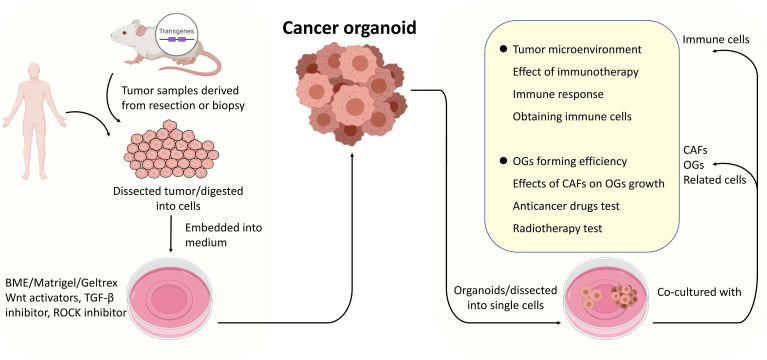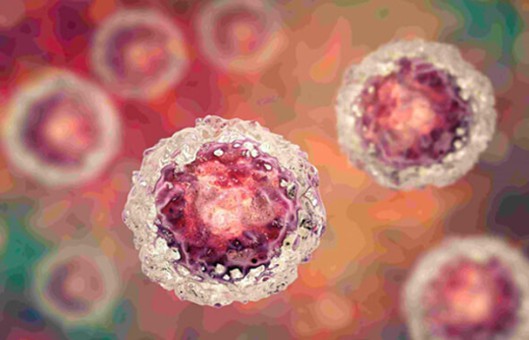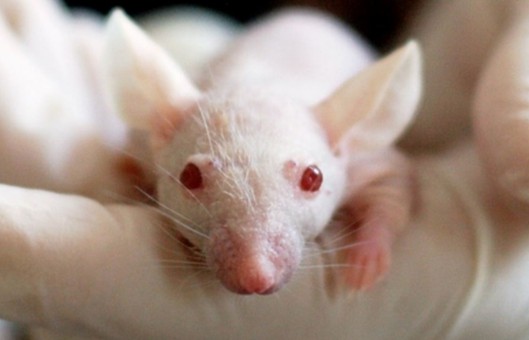Cancer Organoid Co-culture Model Systems
Frontiers in Immunology. 2023 Jan 12; 13: 1061388.
Authors: Yuan J, Li X, Yu S.
INTRODUCTION
As novel tools, current cancer organoids have been well established and rapidly applied in drug testing, genome editing, and transplantation, with the ultimate aim of entering clinical practice for guiding personalized therapy. However, given that the lack of a tumor microenvironment, including immune cells and fibrous cells, is a major limitation of this emerging methodology, co-culture models inspire high hope for further application of this technology in cancer research.
 Fig. 1 The procedures of cancer organoids establishment and applications of the co-culture system.
Fig. 1 The procedures of cancer organoids establishment and applications of the co-culture system.
Co-culture is a method for culturing multiple distinct cell types, directly or indirectly, within the same culture environment. The cancer organoid co-culture model can efficiently simulate the environment for interactions between cancer organoids and cells within a tumor.
Cancer-Associated Fibroblasts (CAFs) Co-culture
- CAFs play a major role in tumor-stromal crosstalk, which can be mediated by cell-cell contact, soluble factors, extracellular vesicles, and metabolites. CAFs account for most tumor microenvironments (TMEs), particularly in colorectal cancer (CRC), and play critical roles in cancer progression, from the regulation of cancer cell proliferation and stem cell maintenance to drug resistance.
- CRC organoids and CAF co-culture were established to obtain an in vitro model for fibroblast plasticity in CRC, revealing that co-culture increased the contractility of CAFs, which was modulated by Wnt and IWP-2. Moreover, CRC-CAF models were developed for drug testing and elucidation of CRC-CAF crosstalk, demonstrating that CAFs maintained the proliferation of CRC organoids in the hydrogels without adding growth factors and regained distinct signaling pathways that were absent in the CRC organoid culture alone but existed in tumors.
Immune Cells Co-culture
- The major application of cancer organoid co-culture models is the co-culture of cancer organoids with immune cells, including cytotoxic T lymphocytes and dendritic cells, NK cells, macrophages, and lymphocytes.
- Co-culturing pancreatic ductal adenocarcinoma (PDAC) organoids with CAFs and CD3+ T lymphocytes to develop a specific TME for PDAC. To obtain tumor-reactive T cells, peripheral blood lymphocytes were added and co-cultured with non-small cell lung cancer organoids, providing a clinically feasible strategy for generating patient-specific T cells for adoptive T cell transfer.
- More recently, a novel co-culture approach was developed to predict the efficacy of precision medicine to achieve a better prognosis for gastric cancer patients, using tumor antigens to stimulate antigen-presenting dendritic cells (DCs), followed by co-culture with CD8+ T cells to promote cytolysis and proliferation of these T cells before co-culture with patient-derived gastric cancer organoids.
CAR-T Cells Co-culture
The co-culture of cancer organoids and TME cells may provide an environment for immunotherapy research, making it a highly appealing and efficient option. CAR-T cells are autologous and allogeneic T cells engineered to target specific antigens and markers on cancer cells, explicitly recognizing and eliminating cancer cells through direct T-cell cytotoxicity. The co-culture of cancer organoids and CAR-T cells provides a platform for predicting CAR-T cell efficacy and toxicity assessment.
Creative Bioarray Relevant Recommendations
Creative Bioarray offers 2,000+ tumor cells from humans and animals in stock. All the tumor cells are comprehensively qualified by testing microbial contamination, virus contamination, and cross-culture contamination.
| Product Types | Description |
| Human Tumor Cells | Creative Bioarray provides you with more than 1,000 human tumor cells from different organs and tissues. |
| Animal Tumor Cells | Creative Bioarray's animal tumor cells cover dozens of different animal species including mouse, rat, bovine, canine, etc. |
| Tumor Cell Panels | Creative Bioarray's tumor cell panels are based on key components of cell signaling pathways or cancer genes. |
RELATED PRODUCTS & SERVICES
Reference
- Yuan J, et al. (2023). "Cancer organoid co-culture model system: Novel approach to guide precision medicine." Front Immunol. 13, 1061388.



